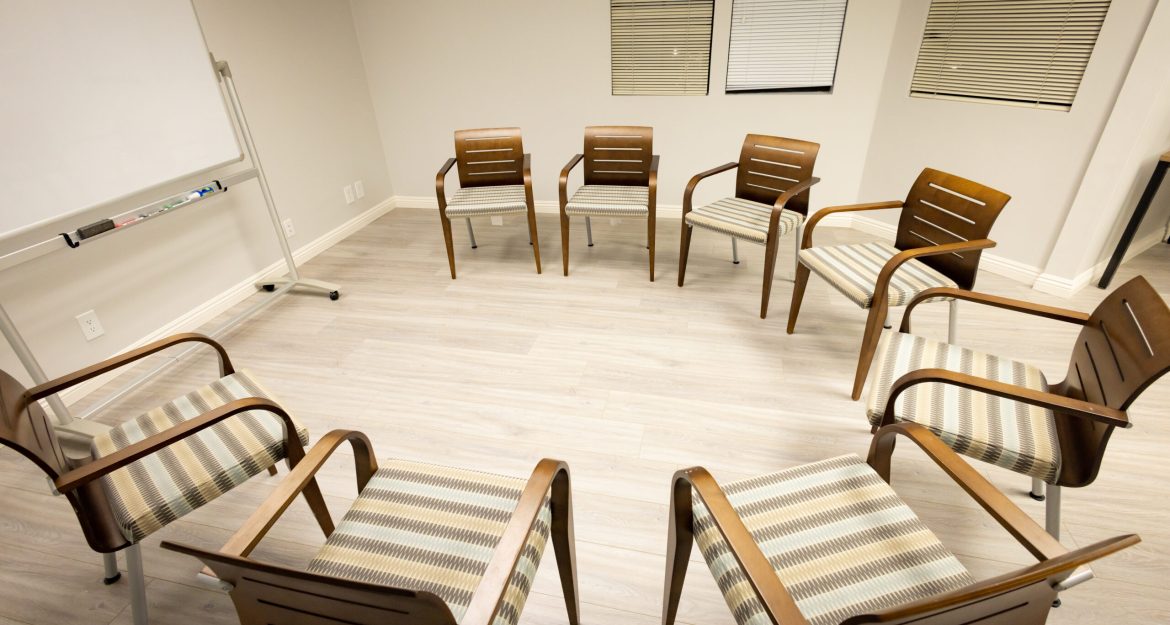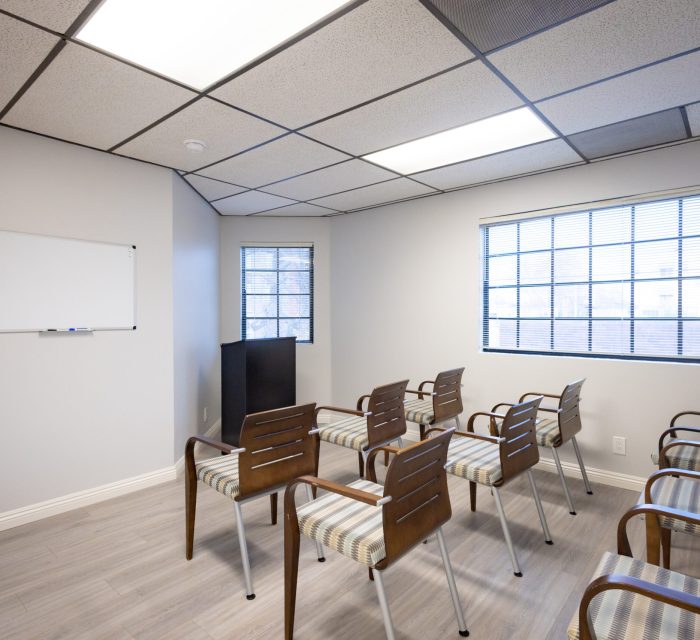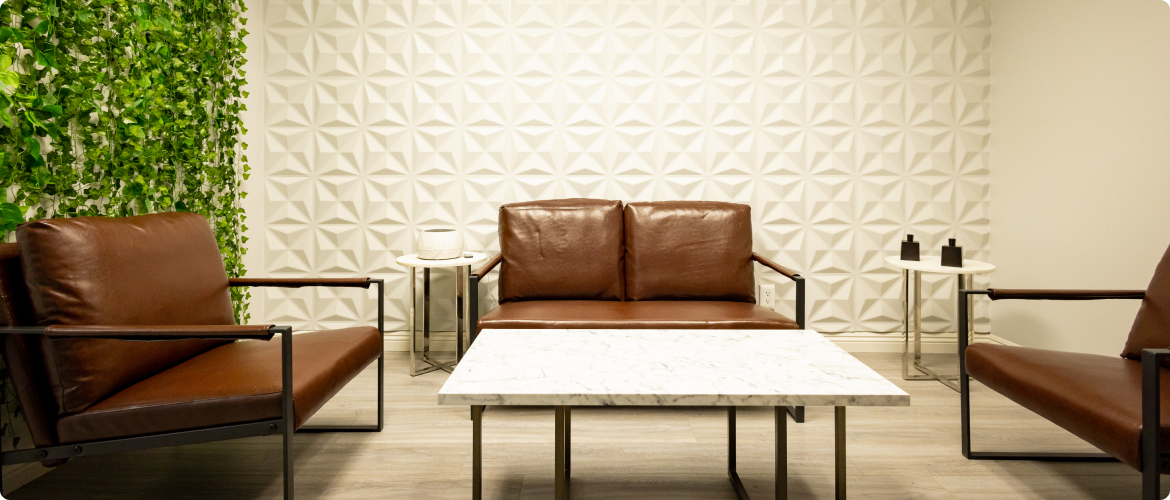Outpatient Addiction Treatment
An outpatient addiction treatment program is a step down from an intensive outpatient program and higher levels of care. Outpatient treatment is beneficial for those transitioning from inpatient programs to everyday life. It can also be incorporated throughout various points of the recovery process, such as if you’re in danger of relapsing and require extra support.

What Is Outpatient Addiction Treatment?
Outpatient treatment for drug and alcohol addiction is a program designed to provide individuals with the care and support needed to successfully transition from inpatient drug and alcohol rehab to everyday life. This level of outpatient care is ideal for those who have already completed an inpatient program, as it allows them to receive ongoing treatment and support during their recovery.
Outpatient drug rehab typically involves attending group meetings several times per week, engaging in individual therapy, and participating in specialized activities that focus on managing cravings, triggers, and other aspects of addiction recovery.
During outpatient treatment, individuals can continue living at home and taking care of their responsibilities while receiving the help they need to stay clean and sober. With the support of professionals, as well as family members and peers, those in outpatient drug and alcohol rehab programs can learn the skills needed to maintain lasting sobriety and live a healthy, fulfilling life.
What are the Advantages of Outpatient Rehab?
An outpatient facility like ours offers several benefits for those recovering from drug and alcohol abuse. Some of these include:

Increased flexibility
Not everyone can take time off work or away from their families to receive addiction treatment in a residential treatment program. With outpatient treatment at Upper Path Recovery, you can receive the care you need while having more say in when you can attend sessions. Individuals in our outpatient program can maintain much of their regular obligations, such as work, school, and family responsibilities. This level of flexibility allows you to keep up with your responsibilities without giving up on your treatment.
An individualized approach
Our outpatient rehab offers treatment tailored to the individual’s needs. We focus on treating the whole person, not just their addiction. We also recognize that every individual’s situation is unique and provide a comprehensive treatment plan to help them reach their goals.
Access to social activities
While participating in our outpatient drug rehab you will have access to recreational activities that are important for mental health and well-being. This includes outdoor activities such as hiking, swimming, and biking that can help you stay active and boost your mood.
Ongoing support
While in our outpatient program, clients can access ongoing support and guidance from clinicians, peers, and family. Most individuals find that they build strong relationships with their peers in recovery. This support system is essential for those in any alcohol or drug rehabilitation programs, as it helps them cope with cravings and triggers while building new friendships.
Cost-effectiveness
Outpatient alcohol treatment and drug treatment are generally more cost-effective than inpatient care. For people with financial difficulties, an outpatient care program at our facility can offer the right level of support for the right price. The reduced cost of outpatient treatment means you also have the chance to stay in treatment for longer periods of time, improving your chances of achieving long-term sobriety.
Immediate application of skills
In outpatient treatment programs, you can immediately start applying the skills you learn during therapy sessions to real-life situations. When you go home each night, you can put the skills and strategies you learned during the day to use. This can help you to continue developing and practicing healthy behaviors, as well as reinforcing the skills you learned in substance abuse treatment.
Ultimately, outpatient drug rehab can be an effective way to take charge of your recovery from substance abuse. At Upper Path Recovery, we are committed to providing a supportive and structured environment for individuals who want to make lasting changes in their lives.
What Does Your Outpatient Treatment Program Include?
At Upper Path Recovery, we offer individualized outpatient treatment options to address your challenges during the recovery journey. Some of our outpatient services for alcohol and drug abuse include:
Individual therapy sessions
Individual therapy provides a safe space for individuals to discuss their thoughts, feelings, and experiences related to their addiction and mental health. During individual sessions, clients can explore the underlying issues that may have contributed to their substance abuse. While participating in outpatient drug treatment as well as outpatient alcohol treatment, clients will receive personalized guidance and feedback from their therapist as they progress in the recovery process.
Group therapy sessions Group therapy is a key component of inpatient and outpatient rehab programs. In group sessions, clients have the opportunity to discuss their experiences with other individuals in similar situations, learn new coping skills, and gain invaluable social support from peers during recovery. Group therapy also helps promote accountability and provides an opportunity to practice new strategies in a safe and supportive environment.
Family therapy sessions
Family therapy is an important part of a successful recovery journey. Our outpatient substance abuse treatment program includes family treatment services that provide families with the skills and knowledge to better understand addiction, learn healthy communication tools, and create strong boundaries for their loved one in recovery.
Support groups
Support groups provide an additional layer of support and accountability for clients in recovery. With the help of trained facilitators, members can learn more about addiction and recovery as well as share their experiences with one another. At Upper Path Recovery, we have multiple peer-led support groups that clients can participate in during their time in treatment. Support groups like Alcoholics Anonymous and Narcotics Anonymous provide ongoing support resources and guidance to help people help themselves while recovering from alcohol and drug abuse. They offer the self-help tools needed to maintain sobriety once you complete your outpatient treatment program.
Motivational enhancement therapy
Motivational enhancement therapy (MET) is an evidence-based approach designed to increase motivation for change within clients. MET helps individuals explore their ambivalence about substance abuse and find meaning and purpose in recovery by helping them set achievable goals, build self-confidence, and develop the skills needed to sustain lasting sobriety.
Medication-assisted therapy
Medication-assisted treatment (MAT) is a comprehensive approach that combines medications with behavioral therapies to treat substance use disorders. MAT is an effective treatment for those struggling with alcohol or opioid use disorder, helping reduce cravings and withdrawal symptoms during the recovery process.
At Upper Path Recovery, we offer MAT for individuals who need additional support in managing their addiction. Our team of medical professionals works to ensure that individuals remain safe and comfortable during the medication-assisted treatment process.
Relapse prevention
One of the biggest challenges people going through outpatient drug rehab face is avoiding relapse. While participating in outpatient rehab, clients have more freedom than with an inpatient treatment program, which means they often face more temptations. During outpatient treatment at our rehab center, clients will learn to identify the warning signs of relapse and create strategies for managing triggers that could lead to a return to substance use. At Upper Path Recovery, our team works with clients to create individualized relapse prevention plans to help them stay on track in their recovery journey.
Continued addiction education
Continued education is an essential part of a successful outpatient recovery program. Our outpatient rehab provides resources and guidance to help individuals in treatment learn more about addiction and recovery. We understand that sobriety is a lifelong journey, so our team strives to equip clients with the knowledge and skills necessary for lasting sobriety after they complete their outpatient program.
Overall, our outpatient drug rehab program provides a structured and supportive environment for individuals to take charge of their recovery from substance abuse. We are committed to providing evidence-based treatment options that address both the physical and psychological aspects of addiction. With the help of our experienced team, you can make lasting changes and take the steps necessary to achieve sobriety and a healthier, happier life.
Your Recovery Starts Here
Our admissions team is ready 24/7 to guide you through the process, from admission to coordinating travel, treatment programs, and more.
What are the Types of Outpatient Rehab?

At Upper Path Recovery, we offer several different types of outpatient rehab programs tailored to the individual needs of each client. Our rehab center provides standard outpatient programs (OP), intensive outpatient programs (IOP), and partial hospitalization programs (PHP) for individuals in recovery from substance abuse.
Outpatient programs are designed for people who need a structured treatment plan for recovery without having to stay at the facility overnight. Standard outpatient programs involve attending scheduled therapeutic sessions during the week and typically last 10 to 12 weeks. Intensive outpatient programs are more intensive than standard OP, with individuals attending multiple therapy sessions throughout the week and continuing care outside the facility. PHPs involve longer treatment times and more intensive therapy sessions than OP or IOP.
How Does Outpatient Treatment Differ from Intensive Outpatient Treatment?
Inpatient and outpatient treatment programs differ in the level of treatment intensity, the structure they provide, and the treatment setting. In inpatient treatment, individuals spend their time living on-site at a drug and alcohol rehab and focus solely on their recovery from substance abuse and mental health conditions. Inpatient rehab provides 24-hour medical and psychological care in a safe, supportive environment. Outpatient programs, on the other hand, allow individuals to remain in their homes while attending scheduled sessions for counseling, therapy, and outpatient services.
Outpatient treatment is less intensive than intensive outpatient treatment (IOP). In an outpatient program, clients typically spend only a few hours each week in therapy and are expected to stay sober outside the facility. Intensive outpatient treatment requires more frequent visits and may include individual and group counseling sessions several days a week, usually for three to five hours a day. With IOP, individuals have more structure and support than in a standard outpatient program, making it a good option for those who need extra help staying on track with their recovery.
Outpatient rehab is ideal for individuals who need more flexibility in their recovery program or cannot commit to an inpatient program. Outpatient treatment offers the same evidence-based treatment practices as inpatient programs but with less structure and fewer hours of treatment each week. Intensive outpatient care is a great option for those who need more intense therapy and counseling services to help them break free from addiction.
Whether you choose inpatient rehab or treatment in an outpatient setting, our team at Upper Path Recovery is here to support you on your journey to recovery. Our experienced clinicians and counselors provide individualized treatment plans tailored to each person’s unique needs, so you can get the help you need in a way that works for you.
Who Should Participate in Outpatient Treatment Programs?
People who have completed residential treatment programs, partial hospitalization, or intensive outpatient programs can turn to standard outpatient treatment to receive continued care. It is a good option for transitioning between more structured programs and your daily life.
Outpatient rehab at Upper Path Recovery can also be an appropriate option for those who have milder addictions and do not have a high risk of relapsing. It is still crucial to have a stable environment with loved ones ready to offer the support you need as you go through outpatient rehab. Those who participate in our outpatient programs should also have reliable transportation to be able to attend treatment sessions.
Those who have more severe addictions that require medical detox and a high level of supervision may benefit from more intensive substance abuse treatment programs, such as a partial hospitalization program, intensive outpatient program, or inpatient treatment. Additionally, those struggling with mental health disorders that require intensive care, monitoring, and intensive mental health services may need a more structured setting than outpatient rehab can provide.
Get Help at Upper Path Recovery
At Upper Path Recovery, we understand the unique needs of our clients and provide comprehensive treatment plans that give you the best chance of success in recovery. We believe in treating the whole person, not just their substance use disorder, so our team works with clients to create individualized treatment plans to address substance use disorders and any underlying mental health problems.
Whether you need to transition from a residential program, need more intensive services than outpatient rehab can provide, or want to start your recovery journey with an outpatient program, we are here to help. Our clinicians and counselors will work with you every step of the way on your journey toward sobriety and overall wellness. Contact our treatment center at (818) 748-4845 to learn more about our programs and services today.
